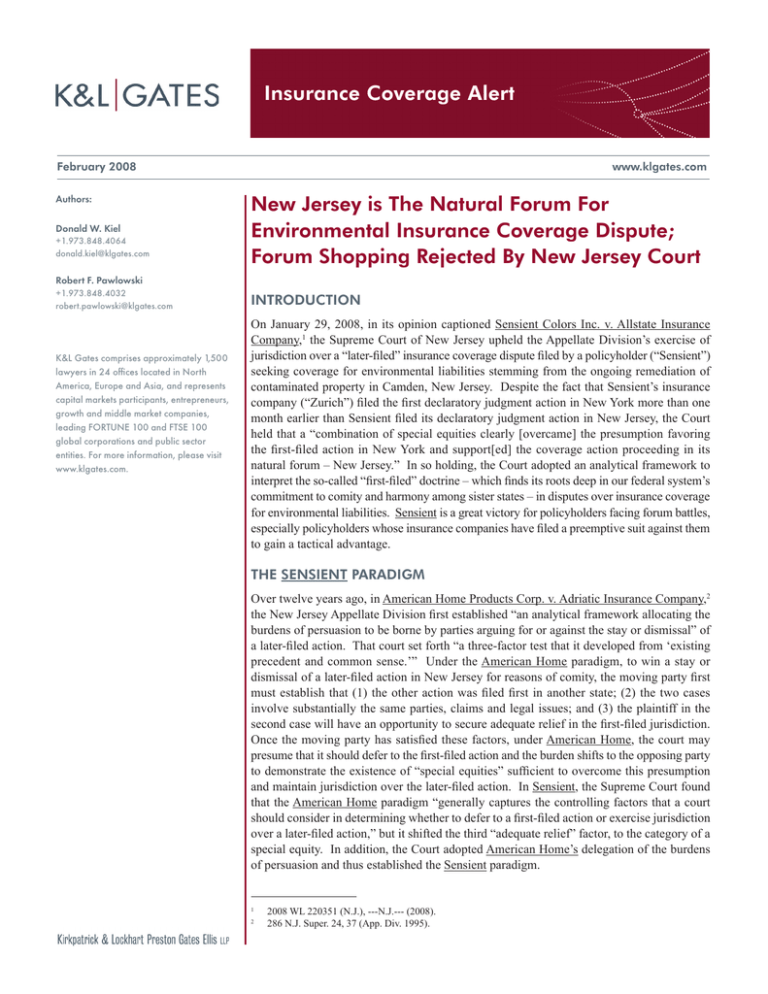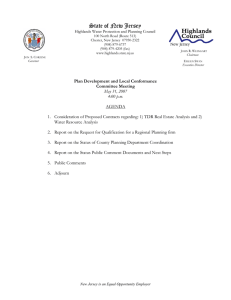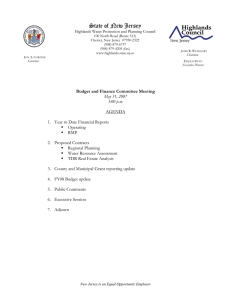
Insurance Coverage Alert
February 2008
Authors:
Donald W. Kiel
+1.973.848.4064
donald.kiel@klgates.com
www.klgates.com
New Jersey is The Natural Forum For
Environmental Insurance Coverage Dispute;
Forum Shopping Rejected By New Jersey Court
Robert F. Pawlowski
+1.973.848.4032
robert.pawlowski@klgates.com
K&L Gates comprises approximately 1,500
lawyers in 24 offices located in North
America, Europe and Asia, and represents
capital markets participants, entrepreneurs,
growth and middle market companies,
leading FORTUNE 100 and FTSE 100
global corporations and public sector
entities. For more information, please visit
www.klgates.com.
INTRODUCTION
On January 29, 2008, in its opinion captioned Sensient Colors Inc. v. Allstate Insurance
Company,1 the Supreme Court of New Jersey upheld the Appellate Division’s exercise of
jurisdiction over a “later-filed” insurance coverage dispute filed by a policyholder (“Sensient”)
seeking coverage for environmental liabilities stemming from the ongoing remediation of
contaminated property in Camden, New Jersey. Despite the fact that Sensient’s insurance
company (“Zurich”) filed the first declaratory judgment action in New York more than one
month earlier than Sensient filed its declaratory judgment action in New Jersey, the Court
held that a “combination of special equities clearly [overcame] the presumption favoring
the first-filed action in New York and support[ed] the coverage action proceeding in its
natural forum – New Jersey.” In so holding, the Court adopted an analytical framework to
interpret the so-called “first-filed” doctrine – which finds its roots deep in our federal system’s
commitment to comity and harmony among sister states – in disputes over insurance coverage
for environmental liabilities. Sensient is a great victory for policyholders facing forum battles,
especially policyholders whose insurance companies have filed a preemptive suit against them
to gain a tactical advantage.
THE SENSIENT PARADIGM
Over twelve years ago, in American Home Products Corp. v. Adriatic Insurance Company,2
the New Jersey Appellate Division first established “an analytical framework allocating the
burdens of persuasion to be borne by parties arguing for or against the stay or dismissal” of
a later-filed action. That court set forth “a three-factor test that it developed from ‘existing
precedent and common sense.’” Under the American Home paradigm, to win a stay or
dismissal of a later-filed action in New Jersey for reasons of comity, the moving party first
must establish that (1) the other action was filed first in another state; (2) the two cases
involve substantially the same parties, claims and legal issues; and (3) the plaintiff in the
second case will have an opportunity to secure adequate relief in the first-filed jurisdiction.
Once the moving party has satisfied these factors, under American Home, the court may
presume that it should defer to the first-filed action and the burden shifts to the opposing party
to demonstrate the existence of “special equities” sufficient to overcome this presumption
and maintain jurisdiction over the later-filed action. In Sensient, the Supreme Court found
that the American Home paradigm “generally captures the controlling factors that a court
should consider in determining whether to defer to a first-filed action or exercise jurisdiction
over a later-filed action,” but it shifted the third “adequate relief” factor, to the category of a
special equity. In addition, the Court adopted American Home’s delegation of the burdens
of persuasion and thus established the Sensient paradigm.
1
2
2008 WL 220351 (N.J.), ---N.J.--- (2008).
286 N.J. Super. 24, 37 (App. Div. 1995).
Insurance Coverage Alert
THE SUPREME COURT DECISION
By way of brief factual background, Sensient’s
predecessor operated a factory located in Camden New
Jersey (the “Site”) where it manufactured colorants,
organic pigments and dispersions for food, drugs,
and cosmetics. In 1998, the New Jersey Department
of Environmental Protection and the United States
Environmental Protection Agency (the “EPA”) found
and removed from the contaminated Site grounds
containers of hazardous substances. The EPA launched
a remedial investigation and thereafter removed
contaminated soil and debris. Its investigation
also revealed that the hazardous waste on the Site
had leached into the soil and spread to the adjacent
property, the Pleasant Gardens apartment complex,
contaminating those grounds with lead. The EPA
issued Sensient a demand for reimbursement (the “EPA
Demand”) and later sued it in a federal court action
to recover over $16 million worth of costs incurred.
The adjacent property owner sued Sensient in a state
court action seeking damages (the “Pleasant Gardens
Action”).
Sensient provided notice to its historical liability
insurance companies, including Zurich, of the EPA
Demand and the Pleasant Gardens Action. Zurich
agreed, under a reservation of rights, to participate in
Sensient’s defense of these actions. Then, “[w]ithout
in any way signaling to Sensient that it had changed its
mind and decided to deny coverage,” Zurich “struck
first” against its policyholder, Sensient, by filing a
declaratory judgment action in New York state court
to determine coverage. Thereafter, Sensient filed its
own declaratory judgment action in New Jersey state
court and a forum battle ensued. “Viewing the case to
be only about a reimbursement claim” and concluding
that “no New Jersey public policy trumped that of New
York,” the trial court in New Jersey gave precedence
to the New York action and granted Zurich’s motion
to dismiss under the first-filed doctrine. The Appellate
Division reversed and reinstated Sensient’s complaint,
finding that the trial court misapplied the American
Home paradigm. Specifically, the Appellate Division
found that (1) Zurich failed to establish a substantial
similarity between the New York and New Jersey
actions; and (2) the trial court overlooked the presence
of special equities, namely New Jersey’s “qualitatively
and economically predominant” contacts, including the
location of Site, with the dispute.
Applying the aforementioned Sensient paradigm, the
Court found no need to address whether the competing
actions involved substantially similar parties and claims
because even if they were identical, the Court found
“that special equities strongly support[ed] New Jersey
exercising jurisdiction over the case.” In particular, the
Court focused on two special equities3 to determine
that Sensient had overcome the presumption in favor of
Zurich’s first-filed action. First and most importantly,
New Jersey has a strong public policy interest in
determining the availability of insurance coverage for
the remediation of environmental contamination within
its borders. This interest continues whether or not the
remediation is complete. The Court found that to hold
otherwise would give “the government or a polluter…a
perverse incentive to delay remediation efforts until the
conclusion of the court case determining coverage.”
Second, New Jersey courts are disinclined to defer to a
first-filed action where the insurance company’s filing
of that action is a “first-strike maneuver” designed to
gain a tactical advantage and deny its policyholder
the opportunity to select its own forum to settle the
coverage dispute.4 The Court’s criticism of Zurich’s
preemptive strike tactics was followed by a citation to
extant law in New Jersey regarding insurance company
bad faith.5
IMPLICATIONS OF THE SENSIENT
DECISION
First, the Supreme Court of New Jersey’s decision
in Sensient unanimously confirms that in addition
to its strong public policy in favor of having New
Jersey law applied to determine insurance coverage
for environmental contamination within its borders,6
New Jersey also has a strong public policy in favor of
having that determination made in a New Jersey forum.
The Court also found the special equities of judicial efficiency and convenience to the parties, based upon the location of witnesses and documents in New Jersey, weighed in favor of a New Jersey forum. Id. at *10.
4
Id. at *9 (“[a]n insurer has a duty to act in good faith with its insured”).
5
Id. (citing Pickett v. Lloyd’s, 131 N.J. 457, 467 (1993)).
6
Id. (citing Pfizer, Inc. v. Employers Ins. Of Wausau, 154 N.J. 187, 207 (1998)).
3
February 2008 | 2
Insurance Coverage Alert
Second, New Jersey will not reward an insurance
company that has filed a preemptive suit against its
policyholder to gain a tactical advantage and such a
preemptive suit may be evidence of bad faith litigation
conduct. Finally, a policyholder with New Jersey
environmental liabilities, that already has been sued to
determine coverage for those liabilities by its insurance
company in a court outside of New Jersey, may wish
to consider whether filing its own coverage action
against the insurance company in New Jersey may be
an appropriate strategy.
K&L Gates comprises multiple affiliated partnerships: a limited liability partnership with the full name Kirkpatrick & Lockhart Preston Gates Ellis LLP
qualified in Delaware and maintaining offices throughout the U.S., in Berlin, and in Beijing (Kirkpatrick & Lockhart Preston Gates Ellis LLP Beijing
Representative Office); a limited liability partnership (also named Kirkpatrick & Lockhart Preston Gates Ellis LLP) incorporated in England and
maintaining our London office; a Taiwan general partnership (Kirkpatrick & Lockhart Preston Gates Ellis - Taiwan Commercial Law Offices) which
practices from our Taipei office; and a Hong Kong general partnership (Kirkpatrick & Lockhart Preston Gates Ellis, Solicitors) which practices from
our Hong Kong office. K&L Gates maintains appropriate registrations in the jurisdictions in which its offices are located. A list of the partners in
each entity is available for inspection at any K&L Gates office.
This publication/newsletter is for informational purposes and does not contain or convey legal advice. The information herein should not be used
or relied upon in regard to any particular facts or circumstances without first consulting a lawyer.
Data Protection Act 1998—We may contact you from time to time with information on Kirkpatrick & Lockhart Preston Gates Ellis LLP seminars and
with our regular newsletters, which may be of interest to you. We will not provide your details to any third parties. Please e-mail london@klgates.
com if you would prefer not to receive this information.
©1996-2008 Kirkpatrick & Lockhart Preston Gates Ellis LLP. All Rights Reserved.
February 2008 | 3


